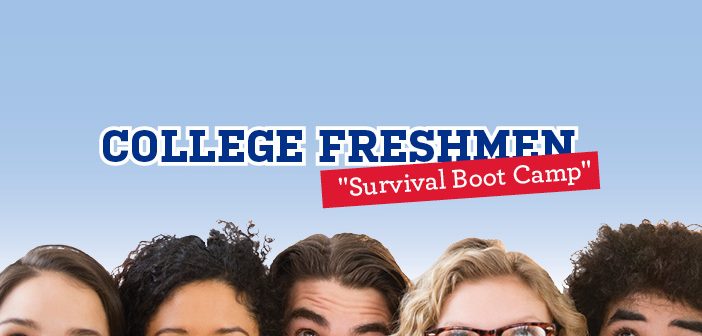Exhale! Your kid is college-bound!
Wipe away those tears, pack the car, and don’t remove the extra place setting just yet. Some 19% of 4-year and 39% of 2-year college students won’t return to school after freshman year (National Center for Education Statistics, April 2017). Reasons for dropping out vary but high on the list is unpreparedness. (Pew Research Center: Is College Worth It? (2011)).
We want to help! Our Survival Boot Camp gives top “survival” tips for students, courtesy of orientation counselors—seasoned students who help freshmen anticipate the worst (and make the most) of their critical freshman year. Share these with your college-bound child to increase their chances for success.
Your Student’s Social Wellbeing
“You be you.”
During freshman year you’ll have many social decisions to make. Make them for your benefit, not others’—and find activities you really enjoy. People will respect your authenticity.
Stay in contact with folks back home for support but make new friends as well. Freshman year is a giant social mixer, but be warned most early connections won’t pan out. Don’t be discouraged by this but make new contacts at every opportunity as those that stick (and enough will) are really important.
Spend time exploring the college/town.
Learn your neighborhood and how to navigate around campus so you know where to go when you need a break. Also, connecting with your town gives you a sense of community that makes you feel like you’re home away from home.
Try new things.
This seems obvious but goes beyond fun/recreation. Join clubs and organizations that seem interesting, and quickly drop those that don’t match expectations. From the “winners” you’ll probably meet like-minded peers who become firm friends, and form a part of your college support network—critical to surviving and flourishing in college.
Your Student’s Academic Wellbeing
Form a support network.
There’s little “hand-holding” at college— so create a network for academic/social support. This includes friends, peers you admire and professors and graduate-student advisors. Their help versus going it alone WILL raise your GPA and might even save you from a failing grade. Your group will also help you secure jobs and internships.
Form a study group & collaborate.
Never go through class alone. Need to skip a morning lecture after a late night and want a proxy note-taker? Can’t quite come up with an “A” thesis? Become part of a study group. Diverse perspectives make for better work (= better grades). And you’ll get to practice career skills like negotiation/debate—all in a non-threatening environment.
Try out new courses.
In the first half of freshman year, don’t be afraid to mix ‘n match academically. Even if you’re “destined” to be an engineer, doctor or lawyer, try some classes just because they sound fun. It’s possible (actually this happens a lot) that you find a brand new major and a lifelong passion.
Your Student’s Career Wellbeing
Go to class every day (well, most of them).
Hearing lectures first-hand is ideal even if notes are posted online. You get attuned to the professor’s likes/dislikes and personality, which gives you an edge when writing assignments. Your professor also gets to know your face and name and sees you participate. Standing out like this in lectures (and remember this applies to office hours, too) is central to an awesome letter of recommendation—and by extension to securing college internships and grants.
College is a breeding ground for careers.
Millennials are expected to emerge career-ready from college, so pressure to snag a college job/internship is huge. Go there to learn—but also utilize career resources—formal and informal. Students who’ve had internships can share their experiences, and even refer you to companies. Also network with professors for job leads.
And don’t forget your Credit Union is here to support you. Some financial institutions see students as prey and load them up with unsustainable levels of debt. We care about getting you through college and financially prepared for a great future. Period.
Our own “college survival kit” includes great savings products (good for college expenses) and savings-secured credit cards to build solid credit while in college (=cheaper car loans!).
Congratulations and good luck to all incoming freshmen!





